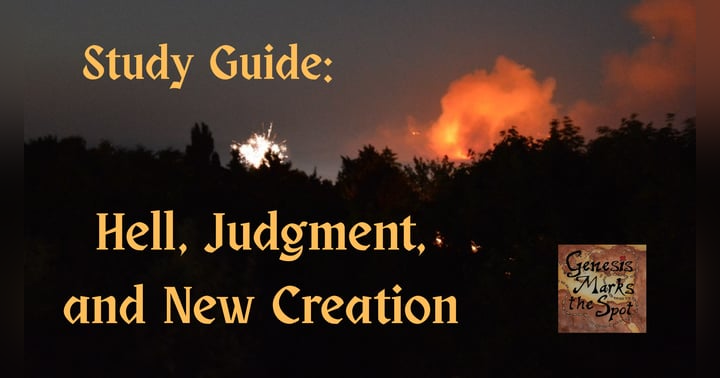Can the Council (and Its Critics) Have Their Cake and Eat It, Too?

You know the old saying: "You can't have your cake and eat it, too." It’s often said when someone wants to hold two mutually exclusive ideas at once. A similar kind of tension shows up in a particular type of critique of the Divine Council Worldview (DCW).
Here's how it often goes:
"Yes, God has a council. But that council isn’t what’s going on in Psalm 82, because surely God can’t (or doesn’t) have his creatures—spiritual beings—in a position where they judge."
This view usually tries to explain itself along two lines:
- A) The rest of Scripture shows people being judged by God (therefore, Psalm 82 must be about humans).
- B) Allowing lower beings to exercise judgment would violate God's sovereignty, because only God is Judge.
Critically, these two lines of argument usually come together — not separately. That's important, as we'll see.
Examining A: Are Humans the Only Ones Who Are Judged in Scripture?
Is it really the case that only humans are judged? Let's check the biblical data:
- Job 15:14-15 reminds us that even the "holy ones" are not pure in God's eyes.
- Genesis 3, 4, 6, Exodus 12, and the parallel texts of Genesis 11 and Deuteronomy 32 demonstrate spiritual rebellion that results in divine judgment. I realize that there's a long track to make some of those cases, but that's why books like The Unseen Realm exist. The point is, there are many, many examples to look at; this isn't just a case of presuming what we want to see. (And note that the inclusion of humans in the circle of judgment does not, then, somehow preclude the spiritual elements also being judged; see 2 Peter 2:4 in relation to the flood, for instance.)
Oh, but what if there’s just a particular view of judgment that we need to look at? What if it’s primarily judgment about ruling over nations?
- Isaiah 14 and Ezekiel 28 portray heavenly figures aligned with human figures in the mirroring of heaven and earth; both realms’ rulers fall under judgment.
Furthermore, 1 Corinthians 6:1-4 points out that believers will judge angels—suggesting that judgment within the spiritual realm is very much part of the biblical picture.
If spiritual beings can be judged, argument A starts to wobble.
Examining B: Does Delegating Judgment Violate God's Sovereignty?
Now, what about the claim that God's sovereignty would be compromised by allowing other beings to judge?
Scripture offers many examples of delegated authority without any hint of compromised sovereignty:
- Moses served as a judge for Israel, by God's command.
- David, king of Israel.
- Romans 13: Government officials are called God's servants to execute justice.
- 1 Kings 22: God works with other spirits to bring about Ahab's downfall.
- ...I could go on and on.
Delegation is not abdication.
A sovereign God can share roles and responsibilities among humans and spiritual beings while retaining ultimate authority. In addition, it’s important to note that this is in the context of how an ancient monarchy would work. This isn’t some sort of democracy or republic where the ruling majority gets their way. Functionaries or vice-regents rule under the authority of the head monarch. That is how they have authority at all.
Rebel against the head monarch? Well, we know how well that works out. Besides, we understand God to be fully just and righteous. If one's ruling is not in alignment with God, it’s not just about disagreement on pizza toppings, but rather decisions that lead to oppression and injustice. Insufficient ruling harms God's creation.
Pulling Apart the Logical Dependency
Here’s the critical point:
- A alone ("people are judged") doesn't eliminate the possibility of spiritual beings being judged. That would be special pleading specifically for Psalm 82, presuming that human judgment is the only valid or normed category — without proving why that should be the case in this psalm. We know from Scripture that spiritual beings can and do rebel—and obviously, when they do, they are held accountable. The biblical worldview doesn’t restrict judgment to humans; it simply shows that rebellion, wherever it occurs, is met with divine justice.
- B alone ("delegating judgment violates sovereignty") doesn't match biblical precedent. In fact, the biblical narrative is saturated with examples of God delegating genuine authority—both to humans and to spiritual beings—while never once compromising His ultimate rule.
But even more than that, if exercising judgment violates God’s sovereignty, then how does it make any more logical sense to have humans in view in Psalm 82? Are we to believe that sinful, fallible humans somehow don’t infringe on God’s prerogative, but loyal or fallen spiritual beings do? That logic reverses itself. It makes the critique self-defeating and actually presupposes that spiritual beings actually might be real threats to YHWH and his authority.
A Council That Doesn’t Council Is Not a Council At All
What often happens is that adherents of the “have your cake and eat it, too” conception of the council try to preserve their view by putting biblical categories into very tight, modern/systematic boxes. I’ve seen some attempt to disambiguate between “courtrooms” and “councils,” insisting that no judgment of the gods of the nations is found in Scripture. I’ve seen people argue that, sure, humans can have choices…just not choices that matter.
But this distinction simply doesn’t hold up to the ancient worldview reflected in the biblical text, and it doesn’t make any more sense to disallow spiritual beings from having real, impactful choices. The nations were consistently seen as having ruling spiritual powers—“gods” who received Israel’s worship in defiance of YHWH. Israel turned to them. They were real players in the cosmic drama, rebels just as real as the serpent in the garden who pulled the people away from their true purpose in following God.
Whatever one’s modern metaphysics, the Bible presents these beings as real, accountable, and ultimately under judgment. To claim that Scripture is silent on their status before God is to ignore a glaring theological and narrative gap. A council that never councils, or rulers that never answer for injustice, goes against the very nature of God’s justice and how he is actively seen to work in salvation history.
Strategic Follow-Up Questions
If you're discussing this view with someone, here are some questions to gently draw out the assumptions:
- "If Psalm 82 were describing non-human beings, would that necessarily conflict with God's sovereignty? Why or why not?"
- "Are we sure that delegation of judgment automatically compromises God's ultimate authority?"
- "In Scripture, does God's sovereignty ever seem threatened when He delegates judgment to humans or angels?"
- "If delegation doesn't compromise sovereignty, does that change how we read the identity of the elohim in Psalm 82?"
Let Scripture Be What It Is
Critics of the Divine Council Worldview often seem more concerned with preserving theological comfort zones than reckoning honestly with the full sweep of Scripture. The only way for them to have their cake and eat it too is if it’s the sugar-free, plastic-display kind—where participation in the council is a mere toy handed to the “kids” for pretend play, never for actual contribution.
But the biblical witness calls us to something far greater: a richer, messier, more glorious supernatural worldview—one that dares to let Psalm 82 mean what it says.








